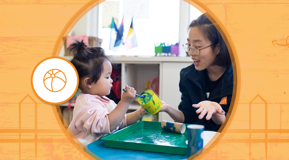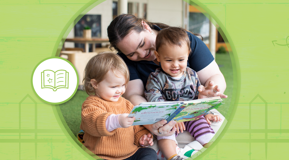Tips and tricks for settling into your centre: the first few weeks

For any family, transitioning a child into preschool can be stressful. A planned approach to starting preschool can help reduce stress and ease the transition for you and your child.
Take these tips from SDN’s educators for a smoother transition into preschool for your child and yourself.
Getting through the first days and weeks
- Pack enough clothes
Make sure you pack enough changes of clothes to cover toileting accidents, getting wet when playing with water, a possible change after lunch (Spaghetti Bolognese!) and that everything is labelled with your child’s name. - Leave precious items at home
Your child might need something to comfort them, but make sure you leave other items at home. - Plan for shorter days at the beginning if possible.
Sometimes children will become upset when other families arrive to pick up their children in the afternoon. Perhaps a grandparent or close friend can collect your child a little earlier in the first weeks at the centre. Call the centre and discuss if this is necessary. All children respond differently when starting. - Choose a book from home to share with their peers and teachers.
This creates a talking point and focus for children who may find drop-off times a little difficult. - Be positive when talking about the centre and when on the way to the centre.
Talk about who they might play with, what they might do today, and the things that you know they enjoy such as playing in the sandpit. Learn the names of the children your child likes to play with so you can support these early friendships. You could also talk about the special aspects of the centre that appeal to your child, like the food or the sandpit. - Be consistent in bringing the child to the centre.
It often is good to have one parent do the “drop off” and another do the “pick up” in the first weeks. It allows you to establish consistency in your approach early on. Having the same predictable routine at home each morning can also be comforting. - It may not be the first week.
Be prepared that your child may become upset after a number of weeks of attending the centre, instead of the first week. This is normal and the team will support you and your child if this occurs. - Take care of yourself
Engage in some self-care activities or arrange to have coffee with a friend who understands how you might be feeling.
Easing the transition – tips for a smoother drop off.
- Create a predictable routine for your child.
Try to arrive at the centre at a similar time each day. If possible, let your child know when you will be collecting them according to the daily routine (for example after late snack). Encourage your child to place their bag in their locker with you and find a trusted educator before you say goodbye each day. - Share as much information as you can with educators.
How did your child sleep? Has anything happened that might affect the way they are feeling? If you forget to pass something on at drop off, don’t hesitate to phone or email the centre later in the day. - Spend a little time with your child in an activity before leaving.
An educator may also join in the activity so there is a natural transition and support in place when you say “goodbye”. Be clear with your child… “Let’s do one puzzle together and then I will say good bye”. A happy ‘goodbye’ may take some time to achieve but it will happen. - When you say goodbye don’t linger.
Lingering can give the message to your child that things are not OK. Educators will help your child to settle and play with others. - Always say goodbye.
Always say goodbye, even if your child is upset. Your child will be supported after you leave. If you feel concerned, call or email the centre when you arrive to work and check your child has settled into their day.









